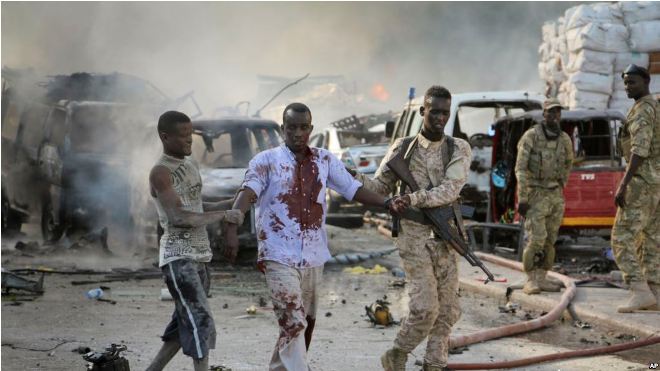
Tuesday October 17, 2017
Mogadishu - Tears streamed down Abduweli Osman's cheeks as he stood in the sticky heat outside a Mogadishu hospital, his last stop in the search for his brother who he now believed was dead.
The last he and his family heard, Abdukadir Ahmed had decided to pass by a popular commercial district in the Somali capital on Saturday known as KM5, before heading home.
But he never arrived.
Instead, there came news that the area had been flattened by a truck bomb.
In addition to inflicting a toll that would rise to more than 300 and 300 injured, the blast destroyed about 20 buildings, including a hotel, restaurant and pharmacy, and incinerated the stores of street vendors selling fruit and jerrycans of fuel that only intensified the blaze.
Like dozens of devastated residents of the capital, Osman went from hospital to hospital to search for his relative, before finally giving up hope.
Proper burial
"It is painful when you simply lose someone you love in a tragedy and you don't even get his dead body to provide proper burial," sobbed the grocer, who is in his thirties.
Inside the hospital is overcrowded, with visitors using handheld fans to cool themselves as they rush between wards, or huddle around injured loved ones suffering burns, shrapnel wounds and broken bones.
Abdinasir Moalim is bringing sheets, pillows, blankets and a mosquito net for his uncle - essential in the under-equipped hospital.
He received a call from his uncle, who was inside the Safari Hotel when the blast occurred, and who managed to call him before his phone died.
"When I went in there I did not know where to start because of the devastation and horrible scene of dead bodies all over the place," he told AFP.
"My uncle's phone went dead but fortunately he was picked up by the rescue workers and he is now at the hospital with the injury, he is fine."
Turkish mercy flight
For many in Mogadishu, the news of yet another attack was a humdrum affair, with deadly bombings a common occurrence since al-Shabaab Islamists were pushed out of the capital in 2011 by African Union and Somali troops.
However, the scale of the attack has stunned the hardy residents of the seaside city, who began a three-day period of mourning on Monday.
"I have never witnessed such a deadly blast, it was like it killed everybody around the area and set all vehicles ablaze," said Moalim.
On Monday, a Turkish military plane flew in medical supplies for the overstretched hospitals, while evacuating some of the injured to Turkey for treatment.
Victims 'unrecognisable'
Already more than 100 unidentified people have been buried who were burned beyond recognition.
While the rapid burial is partly due to Islamic culture, the Somali government also has no proper morgue nor the capability to carry out forensic tests to identify the victims.
"The government exhausted every effort to recognise these dead bodies ... but it became so difficult that it decided to bury them all together," said local government official Muhidin Ali.
"The gruesome dead bodies were displayed at the hospitals for relatives but a few were recognised and most of them not at all, the devastation is something beyond the imagination of humankind," he added.
Despite this, many still held out hope that their loved ones could be found among the living, sitting in wait at hospitals.
Idil Ado, a mother of three, is waiting underneath a thorny tree outside the Medina Hospital along with several other relatives. Her niece has been missing since the blast and they are desperate for any information.
"We have looked for [the girl] in every hospital and we have been here at the Medina Hospital since yesterday. We are still here hoping to get some information, even if she is dead," she said.
Ahmed Farah, a rescue worker at the scene of the blast says hope of finding more survivors are slim to none.
"I don't think there are survivors anymore, about 400 soldiers worked together with the emergency teams in search of survivors and ... I don't see any remaining rubble under which people can live," he said.